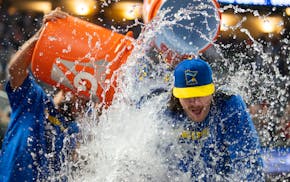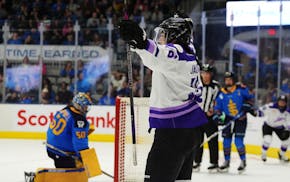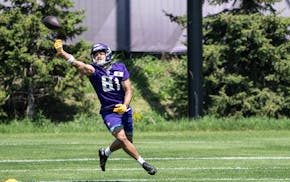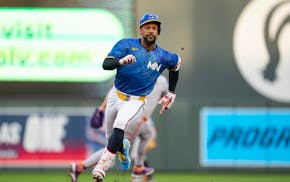Miguel Sano stood within earshot of Kennys Vargas, just a few lockers away, as his teammate expressed the sheer bewilderment he felt over his 2015 season. Why, Vargas was asked during spring training, had he been unable to repeat his rousing 2014 success?
"I don't know. I tried to figure out the reason. I wish I know," Vargas said quietly, gamely trying to answer a question he had contemplated a million times before. "I work hard. I do everything I can."
As Vargas described his frustration, Sano grabbed a bat and walked past, headed for the batting cage. He's working hard. He's doing everything he can. And soon we'll know: Can Sano escape the second-year letdown, the so-called sophomore slump that has bedeviled Vargas, Danny Santana and countless other major league hitters?
If confidence matters — and it does, most established players insist — Sano will be fine.
"Nothing changed. … I can wait for my pitches," said Sano, whose rookie season was a smashing 18-homer, .916-OPS success, one of the best half-season debuts in major league history. "If they throw me different pitches, I'll learn to hit them, too."
Still, as Vargas and hundreds of other players can tell him, things are indeed going to change for Sano, whether he realizes it or not, and not only because he is attempting to learn a new position at the major league level. Same goes for Eddie Rosario and, perhaps to a lesser extent, Tyler Duffey, second-year players looking to build on rookie success.
"That second year, it's always the toughest because the league starts to get to know you," said Joe Mauer, whose OPS declined by 156 points in his second season. "The longer you stay in the league, you learn to make adjustments, but that's really the first time it hits you, how important it is. You get here because of your ability, you may succeed right away because of your raw ability, but then all of a sudden, raw ability isn't enough. So those tough times happen."
A step back, especially after such a breakthrough debut, might be inevitable, Mauer says, but it can be temporary, too. How you deal with second-year slumps — "I don't like calling them slumps," Mauer winces — may determine how long you last.
"It can go both ways. If you do well right away, you get a lot of confidence and maybe it comes as a surprise when people start to figure you out. Your confidence might get dented up a little," he said. "But if you take a step back and realize what other teams are doing to you, if you learn to see the patterns in how people try to get you out, it doesn't have to last long. … [Sano] is a quick learner and a smart hitter. I think he'll adjust."
The Twins' season might depend on it.
"I know all these guys are counting on me," Sano said. "I like it. If I play every day, I know we will win."
That does seem to be the expectation, yes. But simply penciling in Sano for double his 2015 production is setting him up for failure, his manager says.
"To me, when a player makes a big impact in his first experience in the big leagues, those are the guys who are always looked [toward] in regards to a 'jinx,' so it's a little bit artificial," Paul Molitor said. "Your sample size is guys who achieved big things. You've set expectations artificially high, and then whatever they achieve, even as they are just settling in, in the totality of their career, is regarded as a step back. Until a guy establishes a level of production over a few seasons, I'm a little hesitant to say a second-year guy has slumped."
Still, there's no doubt that Vargas and Santana soared in 2014, and crashed a season later. Vargas' WAR, a shorthand statistic that attempts to summarize a player's all-around value, declined from .7 wins in a 53-game rookie season to minus-.7 in 58 games his second year. Santana's second-year plunge was even more dramatic, in home runs (from seven to zero), batting average (.319 to .215), OPS (.824 to .532) and WAR (3.9 wins to minus-2.2).
Those numbers, and the Twins' own history, give Terry Ryan pause. Sano looks like he's beginning a long career, perhaps as a star, and the Twins general manager believes he is. But so were Torii Hunter and Corey Koskie and A.J. Pierzynski, Ryan said, and those players were all returned to the minor leagues more than once early in their careers.
"Sometimes when guys come back, it doesn't quite fall into place, and then all of a sudden things start to unravel a little bit and we send them back," Ryan said. "There's no doubt he's going to be pitched to differently this year."
Does he honestly expect Sano to need to play in Rochester or Chattanooga this year? "I hope not," Ryan said, "but if he does, we'll have to make that call."

Paddack clings to perfection into the sixth inning, pitching the Twins past the Giants
Reusse: Twins play Giants, triggering Mays memories and a question: Can we get the Black players back?

Frost turn away Toronto, even PWHL playoff series at a win apiece

Montigo Moss, working to make the Vikings roster, provides an update on famous father Randy
